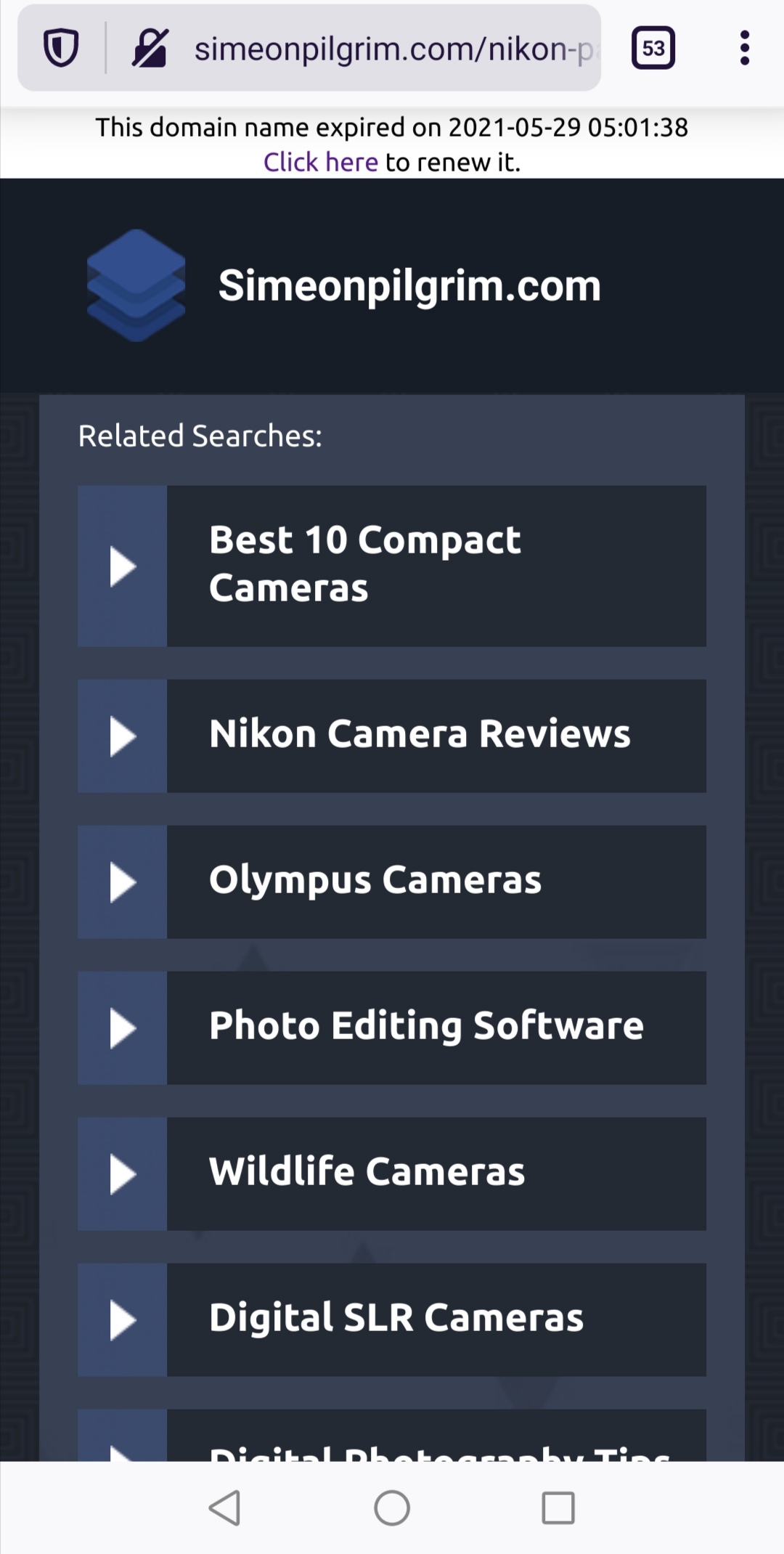Domain name expiration can lead to loss of your online presence. Renew your domain promptly to avoid service interruptions.
Your domain name serves as your digital identity. Losing it can disrupt your business, affect SEO, and alienate customers. Many domain owners overlook renewal dates, leading to unintended lapses. Staying organized is crucial for maintaining ownership. Set reminders in advance to ensure timely renewal.
Domain Name Expiration And Renewal Tips:Consider enabling auto-renewal features offered by registrars. Understand renewal fees to budget accordingly and avoid surprises. Regularly check your domain’s expiration date and keep your contact information updated with the registrar. These simple steps will help you safeguard your online presence and ensure your business remains accessible to your audience. Prioritizing domain management enhances your brand’s reliability and credibility in the digital landscape.
The Life Cycle Of A Domain Name
Understanding the life cycle of a domain name is crucial for website owners. Each stage plays a vital role in maintaining ownership. Knowing these stages helps avoid losing your domain.
Registration Process
The registration process is the first step in securing a domain name. Here are the key points:
- Select a reliable domain registrar.
- Choose a unique domain name.
- Fill out your contact information.
- Complete payment for the registration.
Once registered, you own the domain name for a specific period, usually one year.
Active Period
The active period starts after successful registration. During this phase, you can:
- Build your website.
- Set up email accounts.
- Manage DNS settings.
Maintain your domain by keeping your contact information current. This ensures you receive important notifications.
Expiration Timeline
Domains typically have a registration period of one year. Here is a simple timeline:
| Stage | Time Frame |
|---|---|
| Registration | Year 1 |
| Expiration | After Year 1 |
After expiration, you may lose your domain if not renewed.
Grace Periods
After expiration, registrars often provide a grace period. This period allows you to renew your domain without losing it. Here are the common grace periods:
- Renewal Grace Period: 30 days
- Redemption Period: 30 days after renewal grace
Take action during these times to save your domain.
Consequences Of Domain Expiry
Domain expiry can lead to serious issues for website owners. Losing your domain means losing access to your online presence. Understand the main consequences to protect your website.
Website Downtime
When a domain expires, your website goes offline. This results in:
- Loss of visitors
- Negative impact on SEO
- Loss of credibility
Search engines may remove your site from their index. A long downtime can hurt your ranking. Customers may think your business is closed.
Loss Of Email Services
Your domain also controls your email services. Expiry means:
- Inability to send or receive emails
- Loss of professional communication
- Potential loss of important contacts
Emails sent to your domain will bounce back. This can confuse clients. It harms your professional image.
Vulnerability To Domain Sniping
Once your domain expires, others can claim it. This process is known as domain sniping. The risks include:
- Loss of brand identity
- Increased competition
- Higher costs to regain the domain
Domain snipers quickly register expired domains. They may sell it back at a high price. Protect your domain to avoid these issues.
Importance Of Timely Renewal
Renewing your domain name on time is crucial. It protects your website and brand. Missing the renewal date can lead to serious issues. Here are some key reasons why timely renewal matters.
Maintaining Online Presence
Every business needs an online presence. A domain name is your digital address. Losing it means losing customers. Here are the risks:
- Website becomes inaccessible.
- Search engines may remove your site.
- Visitors may find competitors instead.
Protecting Brand Identity
Your domain name is your brand’s identity. Delaying renewal can harm your brand. Here’s how:
- Competitors might register your domain.
- Confusion among customers can occur.
- Damage to your brand reputation may happen.
Ensuring Business Continuity
Business continuity relies on your domain. A lapse can disrupt operations. Here are some key points:
| Impact | Result |
|---|---|
| Lost Revenue | Lower sales due to downtime. |
| Customer Trust | Customers may distrust your brand. |
| SEO Rankings | Search rankings may drop. |
Stay on top of your domain renewal. Set reminders and use auto-renew options.

Credit: sitecare.com
Renewal Reminder Strategies
Staying on top of domain name renewals is crucial. A missed renewal can lead to losing your domain. Here are some effective strategies to ensure you never miss a renewal date.
Automated Email Alerts
Setting up automated email alerts is a smart move. Most domain registrars offer this feature. Here’s how to set it up:
- Log into your registrar account.
- Navigate to the notifications settings.
- Enable email reminders for upcoming renewals.
These alerts usually come 30, 15, and 7 days before expiration. Check your spam folder, too. Important emails can land there.
Calendar Notifications
Using a calendar app can keep you organized. Here’s how to set it up:
- Open your preferred calendar app.
- Add a new event for each domain.
- Set reminders for 30, 15, and 7 days before the expiration date.
This method gives you a visual reminder. It helps you plan your budget for renewals.
Third-party Monitoring Services
Consider using third-party services for monitoring. These services can track multiple domains. They send alerts for renewals. Here are some popular options:
| Service | Features | Price |
|---|---|---|
| Domain Watcher | Alerts for renewals, transfers, and expirations | $5/month |
| Domain Monitor | Custom notifications for multiple domains | $10/month |
| DNS Monitor | Real-time alerts for domain issues | $15/month |
Choose a service that fits your needs. This can save you from losing valuable domains.
Auto-renewal: Pros And Cons
Auto-renewal can save time and prevent domain loss. It’s essential to understand the benefits and drawbacks. Let’s explore the pros and cons of auto-renewal for your domain names.
Set It And Forget It
Auto-renewal offers a hands-off approach. Once set up, it automatically renews your domain. Here are some key advantages:
- Peace of Mind: No need to remember renewal dates.
- Consistent Ownership: Avoid accidental loss of your domain.
- Time-Saving: Focus on other important tasks.
Many website owners prefer this convenience. It ensures your site stays online without interruptions.
Unintended Renewals
Auto-renewal can have downsides. Unintentional renewals may occur. Consider these points:
- Unwanted Domains: You may forget about old domains.
- Budget Concerns: Unexpected charges can strain finances.
- Over-Renewal: Some domains may no longer be necessary.
Review your domain list regularly. Cancel domains you no longer need. This keeps your expenses manageable.
Updating Billing Information
Keeping billing information current is crucial. Outdated payment details can lead to issues. Here’s what to do:
- Regularly check your payment methods.
- Update credit card information promptly.
- Monitor expiration dates on cards.
Missing a payment can cause your domain to expire. Always stay ahead by ensuring your billing info is accurate. This keeps your domains safe and secure.

Credit: www.icann.org
Manual Renewal Best Practices
Maintaining your domain name is crucial for your online presence. Manual renewal practices help avoid unexpected expirations. Follow these tips to keep your domain active.
Regular Domain Audits
Conducting regular audits ensures your domain stays current. Here are key steps:
- Check domain expiration dates regularly.
- Review contact information for accuracy.
- Confirm payment methods are up to date.
Use a calendar to set reminders. Consider doing audits every three to six months.
Renewal Checklists
A checklist helps streamline the renewal process. Include these items:
- Verify the domain registrar.
- Check renewal costs.
- Review auto-renew settings.
- Confirm DNS settings.
- Update WHOIS information.
Print your checklist for easy access. Mark off items as you complete them.
Registrar Comparisons
Compare different registrars before renewing. This can save you money and time. Consider these factors:
| Registrar | Renewal Price | Customer Support | Additional Features |
|---|---|---|---|
| Registrar A | $15/year | 24/7 Support | Free SSL, Email Forwarding |
| Registrar B | $12/year | Business Hours Support | Free Domain Privacy |
| Registrar C | $18/year | 24/7 Support | Website Builder Tools |
Analyze each registrar’s features. Choose one that meets your needs.
Dealing With Expired Domains
Expired domains can be a headache for website owners. Losing a domain means losing traffic and brand recognition. Luckily, there are ways to recover or reclaim your expired domain.
Recovery Options
Recovering an expired domain can be simple. Here are steps to help you:
- Check the Grace Period: Many registrars offer a grace period. This can last from 30 to 90 days.
- Contact Your Registrar: Reach out to them for help. They may assist in the recovery process.
- Monitor Domain Status: Use WHOIS tools. This shows if the domain is available for renewal.
- Stay Alert: Keep an eye on renewal emails. Don’t miss any notifications.
Backordering Services
Backordering is a useful method for securing an expired domain. Here’s how it works:
- Choose a Reputable Service: Pick a service like SnapNames or NameJet.
- Place a Backorder: This reserves the domain for you if it becomes available.
- Pay a Fee: Most services charge a fee for this service.
- Watch for Auctions: Some expired domains go to auction. Be ready to bid.
Negotiating With New Owners
If someone else buys your expired domain, negotiation is key. Here’s how to approach this:
| Step | Action |
|---|---|
| 1 | Find the Owner’s Contact Info |
| 2 | Craft a Polite Email |
| 3 | Express Your Interest |
| 4 | Discuss Price Fairly |
| 5 | Be Patient and Respectful |
Being polite can lead to a better outcome. The new owner may value your interest.

Credit: community.cloudflare.com
Secure Renewal Transactions
Securing your domain name renewal is crucial. It prevents loss of your website. Here are some tips to ensure safe renewal transactions.
Choosing Trusted Registrars
Selecting a reliable registrar is essential. Trusted registrars have good reputations. Here are some factors to consider:
- Reputation: Check reviews and ratings.
- Customer Support: Look for 24/7 assistance.
- Security Features: Ensure they offer two-factor authentication.
Some well-known registrars include:
| Registrar Name | Reputation Score |
|---|---|
| GoDaddy | 4.5/5 |
| Namecheap | 4.7/5 |
| Bluehost | 4.6/5 |
Secure Payment Methods
Choose payment methods that offer security. Popular options include:
- Credit Cards: They provide fraud protection.
- PayPal: Offers secure transactions.
- Cryptocurrency: An anonymous option for tech-savvy users.
Avoid using direct bank transfers. They are harder to trace.
Avoiding Scams And Phishing
Scams and phishing are common in domain renewals. Here are tips to avoid them:
- Check email addresses carefully.
- Look for spelling errors in URLs.
- Never share personal details over email.
- Verify links before clicking.
Always log into your registrar account directly. Do not use links from emails.
Frequently Asked Questions
What Happens When A Domain Name Expires?
When a domain name expires, it becomes inactive. You lose control over the domain, and it may be put up for auction or available for others to register. It’s crucial to renew your domain before it expires to maintain ownership and avoid losing your online presence.
How Can I Renew My Expired Domain?
To renew your expired domain, log into your registrar account. Locate the expired domain in your dashboard and follow the renewal prompts. If the grace period has passed, you may need to contact support for assistance or pay additional fees to recover it.
What Is The Grace Period For Domain Renewal?
The grace period for domain renewal varies by registrar but typically lasts 30 days. During this time, you can renew without extra fees. After this period, the domain may enter a redemption phase, which can incur higher costs for recovery.
Can I Transfer My Domain Before It Expires?
Yes, you can transfer your domain before it expires. Ensure that your domain is eligible for transfer and that you meet the registrar’s requirements. It’s best to initiate the transfer well before the expiration date to avoid complications.
Conclusion
Securing your domain name is crucial for online success. Regularly check expiration dates and set reminders for renewal. Consider using automatic renewal options to avoid lapses. Staying proactive ensures your website remains accessible. Follow these tips to protect your digital presence and maintain your brand’s reputation effectively.




Leave a Reply